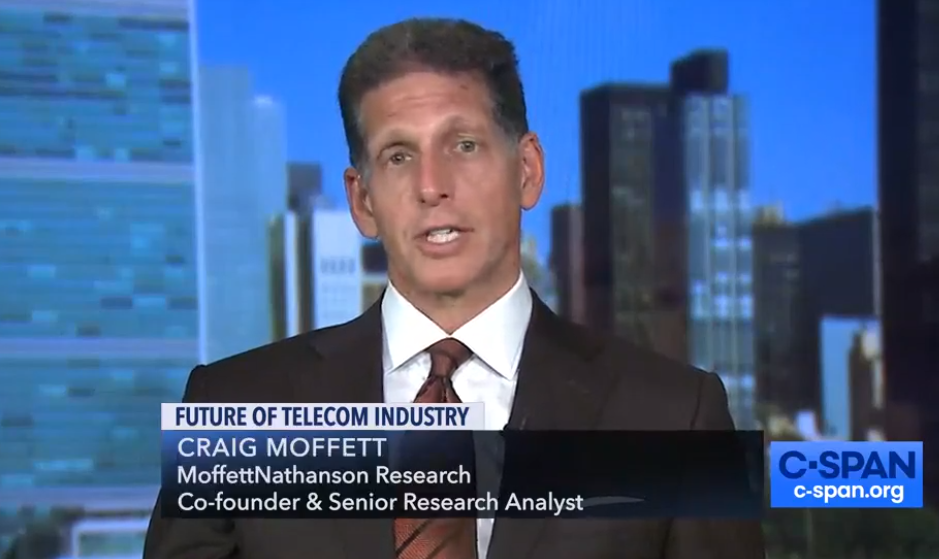Moffett: Virtual MVPDs Are Wave of the Past
The smarter way to stay on top of the multichannel video marketplace. Sign up below.
You are now subscribed
Your newsletter sign-up was successful

Media analyst Craig Moffett says that while the expectation, as recently as a year ago, was that the virtual MVPDs--YouTube TV, Hulu Live--were what was driving the migration from traditional linear TV, today that cord-cutting thesis was probably wrong and that the real driver has turned out to be defecting from live TV altogether.
"The rate of decline has dramatically accelerated for traditional TV, he told C-SPAN in an interview for its Communicators series. He said the new normal for the rate of decline for traditional systems is probably 5% a year, which he called an "extraordinarily rapid decline for something that has been around as long as traditional pay TV distribution.
He said he thought what they were seeing was the "bifurcation" between entertainment and sports, with sports rights, since sports have to be live and have fixed costs that will require the rights fees to climb as subs decline.
He said that makes the system increasingly punitive for consumers who don't watch sports but are paying for them anyway, a point Discovery CEO David Zaslav was making at the Goldman Sachs Communacopia Conference in New York earlier this week.
Moffett said entertainment-only consumers will start saying they don't need live TV anymore and rely on subscription video on demand like Netflix or Disney + or HBO Max.
He says the financial numbers are just starting to reflect that. He says that will give them staying power that traditional players like Direct TV Now don't have. He says while traditional players are forced to raise prices and see their growth slow, while edge players like Google, Amazon and Apple are "playing something of a different game" and afford to subsidize the business much longer.
That could leave traditional players watching their competitive position "fall away" As the Google's of the world lose money on the content but make money on the ads in their shows, but also on the data they collect about what people are watching.
The smarter way to stay on top of the multichannel video marketplace. Sign up below.
Moffett said the current bundle is fraying but that part of the reason that virtual MVPDs are struggling is because they wind up with bloated bundles just like the traditional MVPDs because as with traditional, content companies are telling the new players they "can't get the [must-have] good without taking the bad."
Moffett ultimately sees a world of skinny bundles of sports and news, with entertainment on demand.
Asked to handicap the T-Mobile-Sprint merger's chances in the suit filed by state AG's, Moffett said he thought the states had a better chance at blocking the deal than some were giving it. Still under 50%, but a decent chance.
He pointed out that the Justice Department initially rejected the spin-off of Boost Mobile as a deal-maker, but a couple months later essentially did so with a few things added for "optics."
Moffett's interview airs on C-SPAN Saturday, Sept. 21, at 6:30 p.m. ET and re-airs Monday, Sept. 23 on C-SPAN2 on the 8's--8 a.m. and 8 p.m. ET.
CSPAN is the suit of public service networks funded by the cable industry.
Contributing editor John Eggerton has been an editor and/or writer on media regulation, legislation and policy for over four decades, including covering the FCC, FTC, Congress, the major media trade associations, and the federal courts. In addition to Multichannel News and Broadcasting + Cable, his work has appeared in Radio World, TV Technology, TV Fax, This Week in Consumer Electronics, Variety and the Encyclopedia Britannica.

